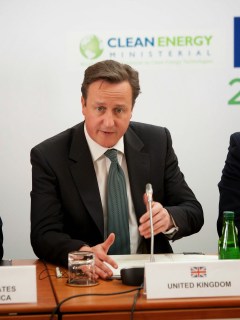 |
| UK Prime Minister David Cameron speaking at the Clean Energy Ministerial in London in 2012. Photo credit: Emma Blackman / DECC via Flickr. |
By Anders Lorenzen
As the UK heads to the polls next month, what should the cleantech priorities be for the next government?
The current UK government led by Conservative Prime Minister, David Cameron, claimed when coming into power in 2010, that he would lead the greenest government ever.
This claim he stands by today. The opposition, led by Labour, would argue that the Conservative / Liberal Democrats coalition government has not done enough to make the UK a world leader in the cleantech industry.
This claim he stands by today. The opposition, led by Labour, would argue that the Conservative / Liberal Democrats coalition government has not done enough to make the UK a world leader in the cleantech industry.
But whoever gets into power come May the 7th, which green policies could give the UK a competitive edge?
A report released by the London School of Economics (LSE) asked some of those questions. It makes clear that the UK has made progress in creating a low carbon and climate proof economy; but also states that challenges remain to make sure that the costs and the high carbon risks are addressed and confronted.
To confront this challenge, the report found that first and foremost it is crucial that a long term investor confidence in UK’s low carbon economy is created.
UK has the potential to be a leader in the cleantech industry, though the report found that the country is now starting to fall behind its competitors, due to increased patenting elsewhere. But UK has the potential to catch up and become a global leader in innovation in several areas.
The report recommends that the next government should increase investment in research and development, which would not only contribute to climate change targets but would also be a key driver of economic growth. UK has a competitive edge in a number of technologies including marine energy, offshore wind, biomass, and energy from waste. The LSE report suggests that these existing technologies should be the key for UK innovation activities. But in the future other areas should be explored, such as carbon capture and storage (CCS), smart grids, electric vehicles, nuclear power, insulation materials and heat pumps, and looking further ahead, investment in hydrogen fuel cells, third generation photovoltaics, energy storage and advanced biofuel technologies.
As more and more people now live in urban areas, cities are well placed to be centers for low carbon activities. The report argues for Investment in integrated public transit, sewers and water systems, congestion pricing, smart grids, smart buildings and decentralised energy networks . With careful planning by local authorities and with government support, this could provide an attractive environment for skilled labour and innovative firms. Investment in these technologies would tackle resource efficiency, dealing with waste, noise and congestion.
But how would all this be achieved?
The report argues that a series of measures be taken. Environmental taxation should be reformed. The UK has a complex energy tax system which means that the carbon tax paid by business is unevenly charged, with some businesses are paying for their emissions several times over. An appropriate carbon price should be determined. There is an argument to align the carbon price towards at a single value for all sectors of the economy, and to clarify whether it is covered by the European Union Emissions Trading System (EU ETS), and if it is in line with the overall UK carbon budgets. The Green Deal, set up by the government to encourage investment in energy efficiency measures, should also be reformed and reviewed as it has had limited success.
Finally, the report says that the UK should show leadership at international climate negotiations, and provide climate finance aid to developing countries seeking to create low carbon economies. The next government will be faced with the crucial task of working out how best to contribute. Technology-sharing, for instance, could be key to helping developing countries along the low carbon route.
The green economy, despite some lack of investor confidence, has grown significantly during this government`s period in office, although the resulting financial benefits have not been stressed enough. The LSE report argues that the UK could take centre stage not only in continuing to develop its own green economy but, by taking the right steps now, be placed to look to an even greener economic future.
Related news:
Never miss a story, sign up to our weekly newsletter:
Categories: conservatives, GE2015, green economy, green policies, Labour, Lib Dems, London School of Economics, low carbon, UK
Very pertinent question Anders
I think:
1. the Feed in Tariff scheme is excellent and should be continued by the next government
2. tougher energy efficient building regulations for 'new builds' should be established
3. the message regarding energy efficiency (in all its forms) needs to be better promotion
4. tax savings for organisations investing in R&D need clearer explanation and public / private / nfp organisations should be encouraged to work together to develop & 'real world' test innovative potential solutions to our climate / carbon / energy challenges
It's a very exciting time and there are lots of commercial & political opportunities to help individual households, communities, nations, continents and even the whole planet enjoy a bright, healthly, prosperous & sustainable future
LikeLike